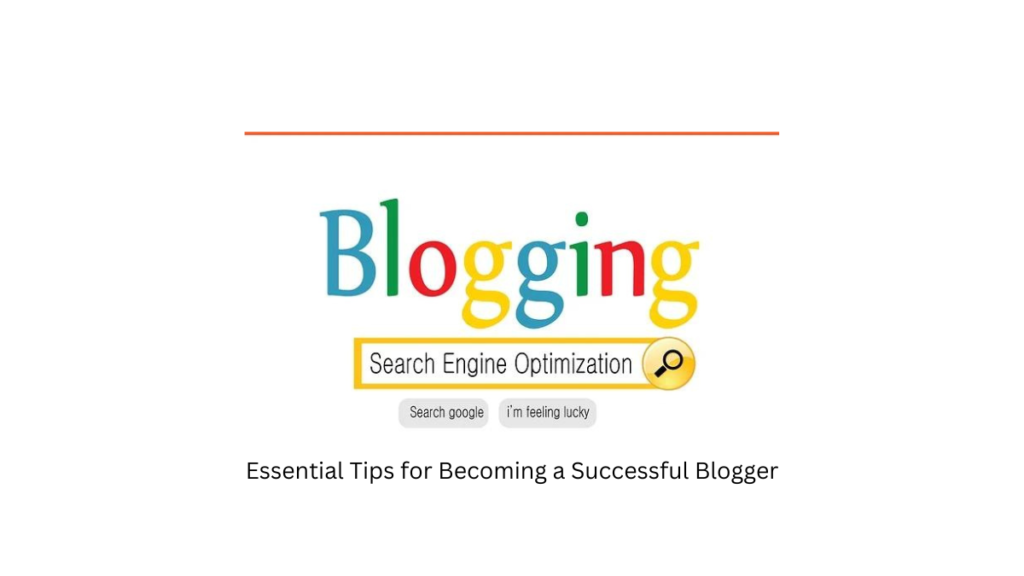Introduction:-
Essential Tips for Becoming a Successful Blogger: Key Things to Keep in Mind

In today’s digital era, blogging has emerged as a powerful means of self-expression, information dissemination, and even a source of income for many. Whether you’re starting your blogging journey or looking to enhance your existing skills, there are essential tips that can pave the way for your success. In this article, we will delve into the key aspects to consider when aspiring to become a successful blogger.
To become a successful blogger, the essential tips should be taken care of?
**1. Discover Your Passion and Niche

One of the first steps in becoming a successful blogger is finding your passion and niche. Writing about what genuinely interests you not only keeps you motivated but also resonates with your readers. A focused niche helps establish your expertise and attract a dedicated audience who share your interests.
**2. Identify Your Target Audience
Understanding your audience is crucial. Define who your ideal readers are, their preferences, and problems they seek solutions for. This insight guides your content creation, ensuring it addresses your readers’ needs and keeps them engaged.
**3. Consistency is Key
Consistency is a hallmark of successful bloggers. Develop a content schedule that aligns with your readers’ expectations. Regular updates keep your audience engaged and show your commitment to delivering value. It’s better to have a consistent posting schedule than to sporadically post in high volume.
**4. Prioritize Quality over Quantity
While consistency is vital, quality should never be compromised. Well-researched, insightful, and original content sets you apart as an authoritative source in your niche. Your readers will value your expertise and return for more high-quality articles.
**5. Master the Art of SEO
Search Engine Optimization (SEO) is integral to increasing your blog’s visibility. Use relevant keywords naturally in your content, optimize meta descriptions, and craft attention-grabbing titles. Well-executed SEO tactics can help your blog rank higher on search engine results pages, driving organic traffic.
**6. Engage and Interact
Building a strong relationship with your readers is essential. Respond to comments promptly and engage with your audience on social media platforms. Encouraging dialogue and addressing their queries make your blog a dynamic and interactive space.
**7. Embrace Constructive Feedback
Feedback is a valuable tool for growth. Embrace both positive and constructive feedback from your readers. It provides insights into your strengths and areas that need improvement, helping you evolve as a blogger.
**8. Harness the Power of Social Media
Social media is a blogger’s best friend for promotion. Share your posts across platforms, create visually appealing graphics, and interact with your followers. The wider your reach, the more likely your blog will gain traction.
**9. Collaborate with Fellow Bloggers
Networking within the blogging community opens up opportunities. Collaborate with other bloggers for guest posts, interviews, or joint ventures. These partnerships introduce your blog to new audiences, fostering growth and engagement.
**10. Stay Current and Adapt
The blogging landscape is ever-evolving. Stay updated on industry trends, technology advancements, and shifts in readers’ preferences. Being adaptable ensures your blog remains relevant and appealing.
Which negative things should be avoided to become a successful blogger?
Becoming a successful blogger requires not only focusing on positive actions but also avoiding certain negative behaviors and pitfalls that can hinder your progress. Here are some negative things you should avoid to increase your chances of becoming a successful blogger:

- Lack of Consistency: Inconsistent posting can lead to a loss of audience engagement. Avoid sporadic updates by creating a realistic content schedule and sticking to it. Consistency helps build anticipation among your readers and keeps them coming back for more.
- Copying Others: Plagiarism and copying content from other bloggers or sources is a surefire way to damage your reputation. Originality is key to success. While you can draw inspiration from others, always provide unique perspectives and content.
- Ignoring SEO: Neglecting search engine optimization (SEO) practices can limit your blog’s visibility. Avoid this by incorporating relevant keywords, optimizing meta descriptions, and ensuring your website’s technical aspects are SEO-friendly.
- Neglecting Your Audience: Ignoring your readers’ comments and feedback can create a disconnect. Engage with your audience through comments, social media, and emails. Responding to their queries and suggestions helps build a loyal readership.
- Overlooking Quality: Publishing content without proper editing and proofreading reflects poorly on your credibility. Avoid publishing articles with grammatical errors, typos, and inaccurate information. High-quality content is essential for building trust with your audience.
- Focusing Solely on Monetization: While monetizing your blog is a goal for many, focusing solely on making money can lead to compromised content quality. Avoid stuffing your posts with excessive ads or irrelevant affiliate links, as it can deter readers.
- Ignoring Analytics: Not analyzing your blog’s performance can hinder growth. Avoid this by regularly reviewing your website’s analytics. Analyze which topics perform well, which posts get more engagement, and adjust your strategies accordingly.
- Neglecting Social Media: Social media is a powerful tool for blog promotion. Avoid underutilizing platforms by consistently sharing your content, engaging with followers, and participating in relevant conversations.
- Becoming Defensive: Negative comments and criticism are part of the online world. Avoid becoming defensive or engaging in heated arguments. Respond politely and professionally, and focus on maintaining a positive online presence.
- Losing Patience: Blogging success takes time. Avoid getting discouraged if you don’t see immediate results. Patience and persistence are essential. Keep refining your skills, engaging with your audience, and adapting to changes.
- Not Learning and Adapting: The digital landscape evolves rapidly. Avoid stagnation by continuously learning about new trends, tools, and techniques. Adapt to changes to keep your blog relevant and competitive.
- Neglecting Self-Care: Burnout can affect your creativity and passion. Avoid neglecting self-care by taking breaks, maintaining a healthy work-life balance, and prioritizing your mental and physical well-being.
By avoiding these negative behaviors, you’ll be better positioned to cultivate a thriving blog that resonates with your audience, builds your online presence, and contributes to your success as a blogger.
To become a successful blogger, how to choose keywords on which more organic traffic can come from Google?
Choosing the right keywords is a crucial aspect of successful blogging, as it helps your content rank higher in search engine results and attract organic traffic. Here’s a step-by-step guide on how to choose keywords that can bring in more organic traffic from Google:

1. Understand Your Niche and Audience: Start by understanding your niche and target audience. What topics are relevant to your blog’s focus? What kind of information is your audience seeking? Knowing your niche helps you identify keywords that are relevant to your content.
2. Brainstorm Relevant Topics: Make a list of topics related to your niche. Think about the questions your target audience might have, common problems they face, and trends in your industry. These topics will serve as a foundation for keyword research.
3. Use Keyword Research Tools: Keyword research tools like Google Keyword Planner, SEMrush, Ahrefs, and Ubersuggest can help you find relevant keywords and provide insights into their search volume, competition, and trends. These tools can guide you in identifying keywords with high search volume and moderate competition.
4. Long-Tail Keywords: Consider using long-tail keywords. These are longer and more specific phrases that users often search for. While they may have lower search volumes, they tend to have higher intent and are easier to rank for. For example, instead of targeting “blogging,” you could target “beginner blogging tips for entrepreneurs.”
5. Analyze Competitor Keywords: Study your competitors’ blogs and websites. What keywords are they targeting? This can give you ideas for potential keywords that might be relevant to your blog as well.
6. Focus on User Intent: Understand the intent behind the keywords. Are users looking for information, product reviews, or solutions to problems? Tailor your content to match user intent, as Google values providing relevant results to its users.
7. Consider Search Volume and Competition: Look for keywords with a balance of decent search volume and manageable competition. Targeting keywords with extremely high competition might be challenging for new blogs. Finding a mix of both can help you rank higher in search results.
8. Check for Trends: Use tools like Google Trends to see if your chosen keywords are trending upwards or downwards. Opt for keywords that have consistent or increasing search interest over time.
9. Localized Keywords: If your blog is relevant to a specific location, consider using localized keywords. This can help attract local organic traffic.
10. Plan a Content Strategy: Once you’ve identified your target keywords, plan your content strategy around them. Create blog posts or articles that provide valuable information related to these keywords.
11. Monitor and Refine: Keyword research is an ongoing process. Continuously monitor your content’s performance using analytics tools and refine your keyword strategy based on what’s working best.
Remember, the goal is to provide valuable content that addresses your audience’s needs while incorporating keywords naturally. Avoid keyword stuffing, as it can negatively impact your content’s readability and SEO. By consistently implementing effective keyword research techniques, you can improve your blog’s visibility, attract organic traffic, and work towards becoming a successful blogger.
Conclusion
Becoming a successful blogger is a journey that demands dedication, continuous learning, and adaptability. By discovering your passion, understanding your audience, and focusing on quality content, you set the stage for success. Consistency, effective SEO, and engaging with your readers create a loyal following. Remember, your growth is ongoing; embracing feedback, leveraging social media, and networking with fellow bloggers are pivotal.





